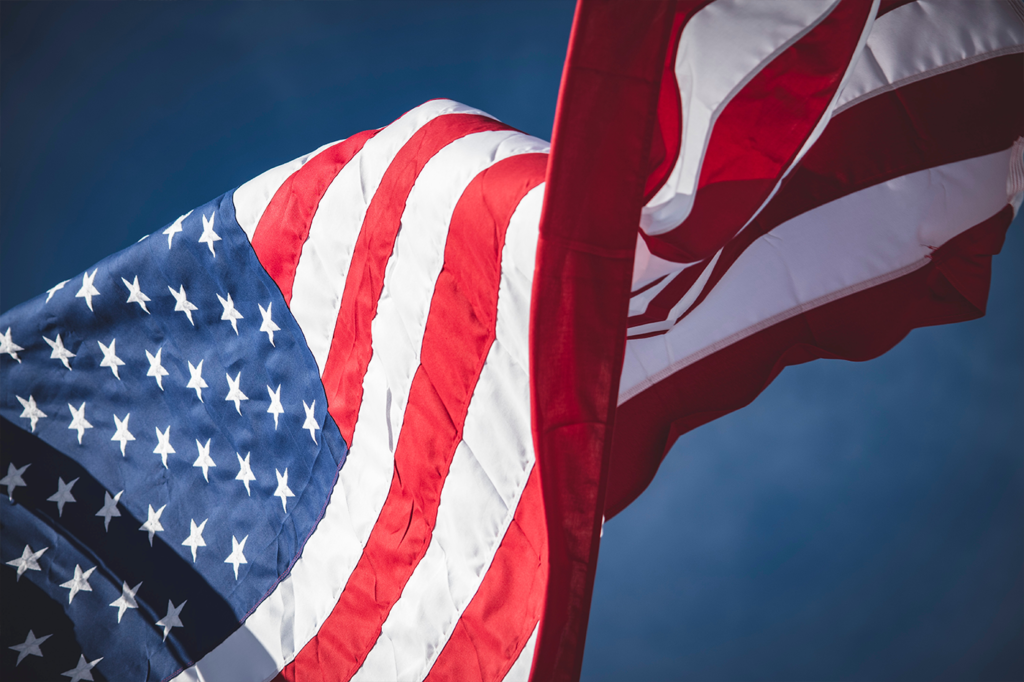The recent conference on “National Conservatism” has brought the concept of nationalism to the fore of American political conversation once more. The fact that Donald Trump self-consciously identifies as a “nationalist” gives added weight to this discussion. The rise of Trump has spurred conservatives like Yoram Hazony (in his book, The Virtues of Nationalism) and Rich Lowry and Ramesh Ponnuru (in a National Review cover story) to offer defenses of the concept. The very existence of a National Conservative conference gives one the sense that nationalism is a live option.
People are rightly anxious about nationalism. Its connection to malignant movements in Europe and Japan in the nineteenth and twentieth centuries gives reason to demur from the nationalist cause. More recently, the association of nationalism with race-based identity politics in America speaks to the ugly, jingoistic possibilities latent in the idea. In short, nationalism is bad, it is said, because it is too parochial and too exclusionary. These extremes together make nationalism too prone to violence. Nationalism is akin to primitive tribalism and thus to be avoided.
But the rising interest in nationalism is also reasonable. In part, the movement is a reaction against a global economy and a global politics that does not respect local boundaries, local histories, or local folkways. In America, in particular, we have seen the way globalization has decimated certain communities. This devastation has contributed to rising drug addiction, suicide, and disability claims, and to a decline in life expectancy in certain areas of the country. Similarly, political correctness run amok seems to denigrate what we might call our national story. The destruction of statues and other artwork, the renaming of buildings and institutions, and the reworking of school curricula all contribute to a sense that there is a part of the American populace that is actively antagonistic to the American creed and the history built around that creed. Contributing to the nationalist backlash is the recognition that this antagonism largely arises among the most privileged Americans. Their condescension is palpable; think of Hillary Clinton’s dismissal of many Trump supporters as “irredeemable” “deplorables.”
The appeal of Donald Trump and other nationalists lies, at least in part, in their willingness to defend those who have lost most in the era of globalization. American nationalists seek to preserve certain unifying national ideals in an era of identity politics and hyper-pluralism. Still, Americans—particularly Christian Americans—should be skeptical about nationalist arguments for other reasons.
Start your day with Public Discourse
Sign up and get our daily essays sent straight to your inbox.Baptizing Nationalism?
Both Lowry and Hazony make explicit appeals to scripture as grounds for promoting nationalism. The argument is essentially that God worked his will in the Old Testament through a specific people in a specific nation, namely Israel.
In contrast to many of Israel’s rivals (Egyptians, Assyrians, Babylonians), who aimed for world (or at least regional) domination, Israel’s aim was more particular. The Hebrew alternative was that of the nation-state, existing within boundaries and living in peace with its neighbors. On this model, each nation ought to recognize the right of other nations to live by its own customs, within its own boundaries. The story of the Old Testament is ultimately the story of Israel attempting to worship their God as it saw fit, with deviation from God’s ways punished through defeat and exile.
This attempt to baptize the nation should give us pause. First, it is worth noting that God, via the prophet Samuel, warns ancient Israel against its desire for a king, because such a worldly king will distract the people from worship of the one God (see 1 Samuel 8). The modern state of Israel is a problematic model, because its religious and ethnic solidarity translates poorly to many other parts of the world, including the United States. Even Israel’s diminutive size gives it a unity that few contemporary nations can mimic.
In addition, the entrance into history of Jesus Christ provides a new perspective on this nationalist interpretation of the Old Testament. Christ fulfills ancient Israel’s purpose, now carried forth by the Church. Christ explicitly extends his message to Jew and Gentile alike. As Paul puts it in Galatians, in Christ “there is neither Jew nor Greek” (Galatians 3:28). The Great Commission and its call to “make disciples of all nations” (Matthew 28:18) suggests a mission that transcends the particularity of nations. The call to “Render therefore unto Caesar the things which are Caesar’s; and unto God the things that are God’s” (Matthew 22:21) is often used to justify a crude division of authority between the state and the church. Which, however, are those things that are not God’s? Is not all of creation His? Even Paul’s famous admonition to obey worldly authorities (Romans 13) is in the context of stating that all authority comes from God. So, to be precise, there is nothing that is Caesar’s independent of God. Caesar doesn’t even own himself.
Similarly, Augustine’s famous division between the City of God and the City of Man does not teach that the City of Man has some autonomous source of power. Augustine makes clear that each City has its proper role, but also that the City of Man has an inferior role. The role of the earthly city is essentially to create basic order and protect against rank injustice. It is the “tranquility of order” that Augustine seeks. But Augustine is not naïve about the earthly city. He famously says that worldly governments that do not properly understand their relation to the divine are “criminal gangs” or “robber bands.” Augustine’s political teaching in City of God is essentially this: the state’s job is to protect public order and then to allow the Church to do what it needs to do, including acts of charity as well as the Church’s more formal sacramental and liturgical duties.
Christians should be cautious about placing too much stake in any nation. As Christ himself suggests, the ultimate kingdom “is not of this world” (John 18:36).
Nationalism as a Substitute for the Church
In his classic work on nationalism, Imagined Communities, Benedict Anderson identified the rise of nationalism with a concomitant decline in the influence of religion. According to Anderson, the nation arose as an instrument of unity as both secularism and religious division weakened the unifying power of faith. Anderson was a Marxist, and he saw nationalism as an obstacle to his universalist ideology.
From a Judeo-Christian standpoint, political theologian William Cavanaugh has likewise argued that it is no accident that the rise of the nation coincided with the rise of secularism. Cavanaugh sees in nationalism a “migration of the holy” from church to state. The Wars of Religion, Cavanaugh has convincingly argued, were motivated as much by secular desire for national consolidation of power at the expense of the church as by religious squabbles. The secular state saw in the Church a rival to its sovereignty.
In the doctrine of “separation of church and state,” the state relegated the church to an inferior position. John Locke illustrates this downgrading of church sovereignty in his Letter Concerning Toleration, often held up as a hallmark of religious liberty. Locke declares in the Letter that the commonwealth’s purpose is “for the procuring, preserving, and advancement of [the individual’s] own civil interests.” Locke then defines the “civil interest” as “life, liberty, and indolency of the body; and the possession of outward things, such as money, lands, houses, furniture, and the like.” His intolerant argument for tolerance culminates when he states, “No opinions contrary to human society, or those moral rules which are necessary for the preservation of civil society, are to be tolerated by the magistrate” and any religion that “undermines the foundations of society” should not be tolerated.
In other words, a religion that questions the unlimited procurement of goods for worldly comfort need not be tolerated. The goods of the Church are now subordinate to worldly, material goods.
Catholic and Protestant Responses
The Catholic Church has resisted the subordination of its rightful authority to that of the state. At the end of the liturgical year, the Catholic Church celebrates the solemnity of Our Lord Jesus Christ, King of the Universe, commonly known as the feast of Christ the King. Pope Pius XI instituted this solemnity in his 1925 encyclical Quas Primas in a deliberate attempt to resist the rise of nationalism and anti-clericalism. Pius laments the advent of ideologies that would place the Church “on the same level” as the state, rather than recognizing that the Church’s mission, that of the salvation of souls, has the pride of place.
In the years immediately following Quas Primas, the call was taken up in the Mexican Church, suppressed by an anti-clerical government. Faithful Mexican rebels took up the rallying cry “Viva Cristo Rey!” or “Long Live Christ the King!”
Those in Protestant circles may turn to the wisdom of C.S. Lewis. In The Four Loves, Lewis considers what it means to love one’s country. Writing in the aftermath of the Second World War, Lewis is rightly anxious about nationalism and cautions his readers against an unhealthy love of one’s nation. There is such a thing as an edifying love of one’s place, Lewis notes, but this is simply patriotism, or “love of the fatherland,” as the word patriotism suggests. Patriotism indicates a kind of familial duty, perhaps echoing the commandment to honor one’s father and mother. For Lewis, an admirable patriotism includes a kind of gratitude that helps draw us outside ourselves. Further, it includes stories, some true and some not, that give a people a sense of who they are and their history. Lewis cautions, however, about glorifying a past that never existed. He is deeply concerned about the need to avoid the worst of nationalist “exceptionalism.” We must not fall under a false belief in the superiority of our own people, which might lead us to believe that we have the right to dominate lesser peoples.
Lewis comments that he prefers the jolly tune “The British Grenadiers” over “Land of Hope and Glory” precisely because it puts love of the homeland in its proper place. “The British Grenadiers” is a pub song; “Land of Hope and Glory” is a hymn. Lewis wishes to remind us that, in developing the virtue of national gratitude, we must remind ourselves that all nations contain elements of moral failure. Our patriotism ought be entwined with humility.
What Holds the Modern Nation Together?
Both Anderson and Cavanaugh remind us that the nation is a creation, not a natural feature of the human experience. The modern nation state, with its size, population, and complexity, certainly surpasses the limits of our natural attachments. Thus, the nation must invent ways to build unity among strangers.
Anderson points to the rise of the novel and newspaper as examples, citing Hegel’s dictum that the newspaper is the modern substitute for morning prayer. It represents a kind of liturgy. Today’s equivalent might be the digital newsfeed delivered to our smart phones. Similarly, Cavanaugh notes the way nationalism takes on the trappings of religion. We have our holy days (Independence Day, Memorial Day), our saints (George Washington, Harriet Tubman), our martyrs (Abraham Lincoln, Martin Luther King), our prayers before important events (National Anthem, Pledge of Allegiance). Indeed, as Patrick Deneen reminded attendees at the National Conservativism conference, the Pledge of Allegiance was developed by socialist Francis Bellamy precisely as a kind of secular prayer to replace theistic religion as the glue of the nation.
Deneen’s presentation was edifying in its defense of localism amid the nationalist rhetoric. The size and complexity of most modern nations should caution against the quasi-religious methods needed to bind a disparate people together. Nationalism, as defined in the early American experience by those such as Alexander Hamilton and Henry Clay, largely meant a nation bound by commerce, finding its unity in commercial activity. Do we really want to reduce ourselves as a people to mere fellow exchangers of goods? For good reason, this thin economic conception of community is being rejected in the movements against the globalized economy and open immigration. A mutual commitment to self-interest does not seem sufficient to provide the communal meaning that people crave.
It may be worth asking whether the nation as it exists today is sustainable, keeping in mind the modest conception of the state as defended by Augustine and the limits of human nature. Put simply, what do I as a South Dakotan really have in common with someone from New Mexico or Vermont? How close can I really feel to people whom I do not know and whose way of life is strange to me? Can I really feel “at one” with over 300 million Americans? Communities have things in common. It would seem the thick community that today’s nationalists wish to revivify is unlikely to occur outside exceptional nations such as Israel. Yet, as Deneen suggested, perhaps a greater appreciation and patience with local folkways and habits would help people feel more at home in their communities, including the national community.
A vibrant localism would allow residents to find meaning in their local communities, especially religious communities, and give a sense of purpose and belonging that nationalists rightly perceive is missing for many citizens. The personalist attachment of local community means we need not resort to the substitute religion of nationalism. We can have a proper gratitude, a healthy patriotism, with all the festival and pageant surrounding it, without imagining a community that doesn’t really exist. We may then concentrate on that ultimate kingdom that is not of this world, to which our true allegiance belongs.














